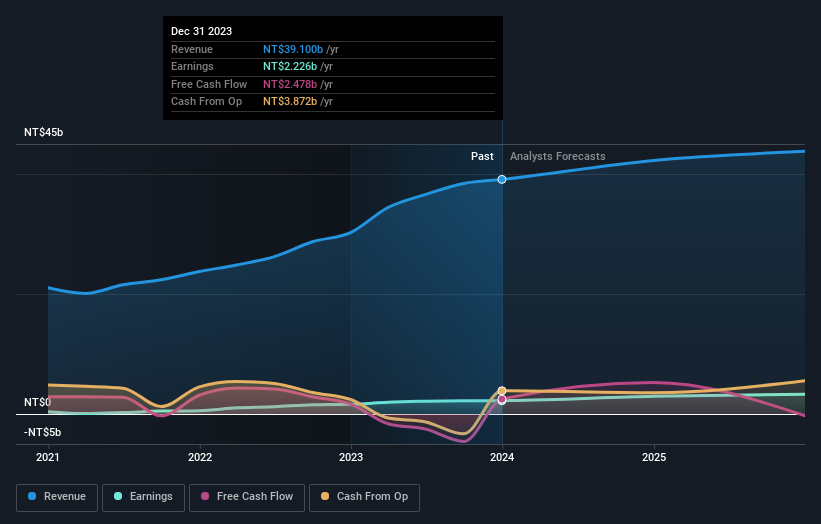Stock Analysis
- Taiwan
- /
- Aerospace & Defense
- /
- TWSE:2634
Aerospace Industrial Development Corporation's (TWSE:2634) biggest owners are retail investors who got richer after stock soared 5.8% last week

Key Insights
- Significant control over Aerospace Industrial Development by retail investors implies that the general public has more power to influence management and governance-related decisions
- The top 7 shareholders own 50% of the company
- 18% of Aerospace Industrial Development is held by Institutions
A look at the shareholders of Aerospace Industrial Development Corporation (TWSE:2634) can tell us which group is most powerful. And the group that holds the biggest piece of the pie are retail investors with 47% ownership. In other words, the group stands to gain the most (or lose the most) from their investment into the company.
Clearly, retail investors benefitted the most after the company's market cap rose by NT$2.9b last week.
Let's delve deeper into each type of owner of Aerospace Industrial Development, beginning with the chart below.
Check out our latest analysis for Aerospace Industrial Development

What Does The Institutional Ownership Tell Us About Aerospace Industrial Development?
Many institutions measure their performance against an index that approximates the local market. So they usually pay more attention to companies that are included in major indices.
As you can see, institutional investors have a fair amount of stake in Aerospace Industrial Development. This suggests some credibility amongst professional investors. But we can't rely on that fact alone since institutions make bad investments sometimes, just like everyone does. If multiple institutions change their view on a stock at the same time, you could see the share price drop fast. It's therefore worth looking at Aerospace Industrial Development's earnings history below. Of course, the future is what really matters.

Aerospace Industrial Development is not owned by hedge funds. Ministry of Economic Affairs, R.O.C is currently the company's largest shareholder with 35% of shares outstanding. In comparison, the second and third largest shareholders hold about 8.0% and 2.0% of the stock.
We did some more digging and found that 7 of the top shareholders account for roughly 50% of the register, implying that along with larger shareholders, there are a few smaller shareholders, thereby balancing out each others interests somewhat.
Researching institutional ownership is a good way to gauge and filter a stock's expected performance. The same can be achieved by studying analyst sentiments. There are a reasonable number of analysts covering the stock, so it might be useful to find out their aggregate view on the future.
Insider Ownership Of Aerospace Industrial Development
The definition of company insiders can be subjective and does vary between jurisdictions. Our data reflects individual insiders, capturing board members at the very least. Company management run the business, but the CEO will answer to the board, even if he or she is a member of it.
Most consider insider ownership a positive because it can indicate the board is well aligned with other shareholders. However, on some occasions too much power is concentrated within this group.
Our data suggests that insiders own under 1% of Aerospace Industrial Development Corporation in their own names. It is a pretty big company, so it would be possible for board members to own a meaningful interest in the company, without owning much of a proportional interest. In this case, they own around NT$34m worth of shares (at current prices). Arguably, recent buying and selling is just as important to consider. You can click here to see if insiders have been buying or selling.
General Public Ownership
The general public, who are usually individual investors, hold a 47% stake in Aerospace Industrial Development. This size of ownership, while considerable, may not be enough to change company policy if the decision is not in sync with other large shareholders.
Next Steps:
I find it very interesting to look at who exactly owns a company. But to truly gain insight, we need to consider other information, too. Consider risks, for instance. Every company has them, and we've spotted 2 warning signs for Aerospace Industrial Development you should know about.
If you are like me, you may want to think about whether this company will grow or shrink. Luckily, you can check this free report showing analyst forecasts for its future.
NB: Figures in this article are calculated using data from the last twelve months, which refer to the 12-month period ending on the last date of the month the financial statement is dated. This may not be consistent with full year annual report figures.
Valuation is complex, but we're helping make it simple.
Find out whether Aerospace Industrial Development is potentially over or undervalued by checking out our comprehensive analysis, which includes fair value estimates, risks and warnings, dividends, insider transactions and financial health.
View the Free AnalysisHave feedback on this article? Concerned about the content? Get in touch with us directly. Alternatively, email editorial-team (at) simplywallst.com.
This article by Simply Wall St is general in nature. We provide commentary based on historical data and analyst forecasts only using an unbiased methodology and our articles are not intended to be financial advice. It does not constitute a recommendation to buy or sell any stock, and does not take account of your objectives, or your financial situation. We aim to bring you long-term focused analysis driven by fundamental data. Note that our analysis may not factor in the latest price-sensitive company announcements or qualitative material. Simply Wall St has no position in any stocks mentioned.
About TWSE:2634
Aerospace Industrial Development
Aerospace Industrial Development Corporation engages in the development, manufacturing, integration, assembly, and testing and verification of aircraft systems and parts in Taiwan and internationally.
Excellent balance sheet with proven track record.

